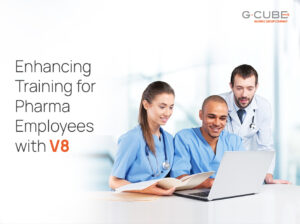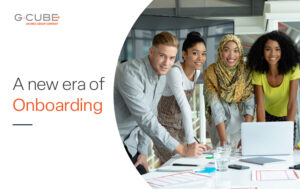On October 9th -10th, G-Cube attended India’s largest and most prestigious Chief Learning Officers’ Summit, which brought together learning leaders from different industries from all over India and the world. The event was also a forum that included prominent personalities from the field of Sports, Literature and Journalism. The theme of event was – Organizational Learning: Impacting business, Changing the game. And we believe that the greatest trend that is changing the game, transforming the way people learn in the 21st century is Technology-aided Learning.

The rapid pace of technological change is at the core of this shift affecting how workforce training is delivered as well as consumed. The success of an organization has always depended on how skilled and knowledgeable is its workforce. But it is important to note that today’s rate of change in processes and workplace tools requires much more on-the-job training than it did in the past. As more workers become knowledge workers, the demand for frequent training is further accelerated with each technological shift. Updating the skills and knowledge of employees critical in today’s economy, and the efficiency with which companies do so can thus be critical in helping them maintain a competitive edge. The Internet also holds a strong promise for workplace learning since it easily accommodates multiple learning styles and distributed learning models. Thus internet as a medium is well matched to the new requirements of education and training in the knowledge-based economy. According to a report released by the Internet and Mobile Association of India (IMAI) and IMRB, India has an estimated 243 million internet users. This brings to focus how relevant is Technology-aided learning for workplace training – especially in context of our country.
G-Cube has been at the vortex of the shift towards technology-aided learning since the days of early adoption. Today, our learning and experience has culminated in the creation of e-learning solutions that mirror what industry experts confer – about what workplace learning is all about today and what modern workplace learners really want out of learning.
The learners’ perspective: Solutions to cater to the needs of the workplace learner
- Variety in Learning: All learning and development leaders agree that a training solution is as successful as it is relevant to the nature of the Learners’ area of work. That being said, the extent of what is relevant is now a vast area that includes not only skills/knowledge that enables the learner to do his job but also the skills/knowledge that empower him to do his job well. So it is important to include a variety of trainings that remain relevant to the learners and can be accessed as per their own perceived needs. When implementing our proprietary LMS for a variety of learners and different organizations, we perceived an increasing need for pertinent learning content to keep abreast of the changing needs of the corporate learners. We also felt that many organizations do not have the in-built capabilities to keep up with this need and do not know where to look for help. In collaboration with leading e-content experts and developers, we created a knowledge repository with e-courses on a variety of topics. While the LMS provided the necessary learning platform, the knowledge repository makes sure that there is never a dearth of relevant content to satisfy the growing appetite for organizational learning.
- Multi-device learning experience: The popularity of mobile devices, including tablets and smartphones, is skyrocketing making the shift from desktop to mobile increasingly perceivable. So the ideal learning solutions have to be mobile-compatible and have the capability to run seamlessly on different mobile platforms – making the concept of ‘learning on the go’ a reality for modern corporate learners.
By employing technologies like Responsive Web Design (RWD) and touch-friendly screens modern LMSs provide learners an enhanced user-experience on any device of their choice. With RWD, it is now possible to create content that is not only compatible with multiple devices but also suitably altered for viewing across varying devices. This technology has been utilized extensively for creating websites, and it is now being utilized to build LMSs as well. Touch-friendly LMS screens make it easy for the learner to access mobile content on the go. Considering the popularity of touch-friendly mobile devices, the touch-friendly LMS is an obvious winner – agreed by all learning experts.
- Social interactions and Gamification in Learning: Learning leaders also agree and strongly recommend the social flavor in learning today. In spite of its evident popularity, technology-based learning still has the challenge of ‘social loafing’ – which occurs when the learners are not suitably challenged or motivated. LMS today thus have in-built avenues of safe and secure social interactions between learners, instructors as well as subject matter experts. Through live-chat, discussion boards, wikis and blogs, learners can be motivated to discuss and debate issues – even beyond the limits of classroom interactions. This increases the impact of workplace learning by leaps and bounds.
Gamification of learning is not a juvenile concept and Learning leaders are hopeful of its utilization for corporate learning as well. Learning games are a big hit – not only for work-specific skills training but for soft skills, employee development and so on. Many new age LMS’s including our proprietary WiZDOM LMS have now started incorporating gamification elements to enhance learner motivation – like earning badges, points and certificates. This provides motivation for younger as well as older learners, who have certain misgivings about technology aided learning – and on the whole makes learning a whole lot of fun!
The organizations’ perspective: Solutions to cater to the needs of the modern workplace
- Assessments and Reporting: A major concern for all industry leaders is how can learning efforts be quantified or assessed through the reporting facilities within a Learning Management System. While most basic LMSs have tracking facilities that generate reports on learning uptake, most organizations want more. Modern organizations want reports that not only provide an insight into learning uptake but provide insights on making the learning endeavor better. They want reports that can be utilized by learners themselves – a step into the process of making learners’ completely responsible for their own training. Modern LMSs, including our WiZDOM LMS has the capability of generating multiple reports – for learners as well as managers and administrators. The reports can be generated and saved in multiple formats increasing the utility of the LMS manifold.
- Cloud-based learning solutions: The increasing use of technology in learning and LMS come with overheads in the implementation and maintenance of the new system. The erratic business conditions have made many organizations question the amount of time and finances invested in managing an LMS. Even companies which excel in change management find it difficult to achieve widespread adoption of technology-aided solutions and thus reap a positive ROI. One way to minimize investments and overheads of learning solutions is to adopt cloud-based LMSs. Cloud LMSs are budget-friendly as well as easier to maintain on account of faster updates, upgrades, and fixes. Organizations are now increasingly adopting Cloud-based learning solutions in an effort to economize while maintaining efficiencies through perennial learning.
- End-to-end learning solutions: Keeping in mind the need to effectively manage training budgets and challenging timelines, organizations today have an increased affinity for e-learning companies which provide not only the learning platform, but the resources to manage and sustain it as well. In this respect, G-Cubes’ WiZDOM LMS comes with its Knowledge Repository – to cater to the content requirements of the organization. Many organizations are keen on learning but do not have the people-strength to take the initiative forward and sustain it for perennial learning. For such organizations, WiZDOM Mentors and Administrators can lead as well as manage organizational learning – making sure that lack of in-house capabilities does not pose as a deterrent for learning. The WiZDOM mentors and administrators have impeccable professional expertise in creating the best avenues for learning and help derive the most ROI – something that all organizations aspire to achieve.
Training and learning in the organizational context is not what it was even a decade ago – and it is changing continually, keeping pace with changing technologies. Our learning leaders are optimistic of the effects of change on organizational learning. At the end of the conference and two days of deliberation, G-Cube is optimistic as well – that we are headed off the right track and we must continue our efforts to align with the needs of the modern workplace as well as the modern workplace learner.To know more about our solutions, write to in**@gc**********.net or fill the form below and we will get back to you right away!







